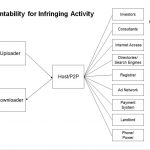512(f) Claim Against Robo-Notice Sender Can Proceed–Enttech v. Okularity
Okularity “represents” several photography clearinghouses. This means that Okularity’s robots scour the Internet looking for clearinghouse photos and then send automated takedown notices for alleged infringements. “Okularity waits until the notices accumulate to the point when a social media platform…

YouTube Defeats Lawsuit Over Cryptocurrency Scam–Ripple v. YouTube
Ripple Labs developed a cryptocurrency called XRP. Scammers phished verified YouTube accounts and then used the hijacked accounts to post YouTube videos–seemingly from Ripple–inducing consumers to transfer their XRP, where they were stolen. YouTube allegedly responded to takedown notices slowly….
Who Owns Vacation Photos of You? Probably Not You–Hubay v. Mendez
A perennial copyright law professor hypothetical: who own the copyright to a person’s vacation photos? Obviously the vacationer owns the photos they take, including any selfies. But if you hand over the camera to a stranger/passerby, who owns that photo?…

Court Sends Wyze Labs Privacy Suit to Arbitration
Wyze provides home security monitoring and cameras. (They have a range of “smart home” products.) Plaintiffs sued Wyze on behalf of a putative class alleging that Wyze failed to safeguard their personal information. Wyze moved to compel arbitration. The court…
Facebook Can Block Scraper (For Now)–Facebook v. BrandTotal
BrandTotal offered a Chrome extension called “UpVoice.” Once installed, the extension allegedly scraped public and non-public information from the users’ Facebook and Instagram accounts. Facebook attempted to crack down on the extension. It terminated BrandTotal’s Facebook and Instagram pages and…

The Case Against Holding Amazon Liable for Third-Party Merchants’ Sales in its Marketplace (WSJ Cross-Post)
[In February 2020, I participated in a Wall Street Journal “debate” on the question: “Should Amazon Be Responsible When Its Vendors’ Products Turn Out to Be Unsafe?” The proponent was Ted Janger from Brooklyn Law School. I was the opponent….

Court Upholds Gaming App’s Clickthrough TOS–Ball v. Skillz
Skillz’s app 21 Blitz allowed players to play blackjack against each other. To sign up for the app, players had to navigate the following screen: The linked TOS contained a prominent arbitration clause. Two plaintiffs sued Skillz for locking them…

My California Young Lawyers Association Interview About Emojis
[In August, I did an interview with Skyler Gray that ran in the California Young Lawyers Association newsletter.] How did an intersection of emojis and the law begin? Were there legal issues concerning the original punctuation emojis, such as “:)”…

Copyright Plaintiffs Can’t Figure Out What Copyrights They Own, Court Says ¯\_(ツ)_/¯
This is one of several cases where major copyright owners are trying to punish Internet access providers (IAPs) for alleged infringements by their subscribers. Earlier this year, the court refused to dismiss the lawsuit in an opinion I described as…

If You Want an Enforceable Online Contract, You Better Keep a Good Chain of Evidence–Snow v. Eventbrite
Eventbrite wanted to send a lawsuit to arbitration, so it invoked the arbitration clause in its TOS. But did the plaintiffs assent to Eventbrite’s TOS? The court says no. What went wrong? Eventbrite has three online venues: its desktop website,…
